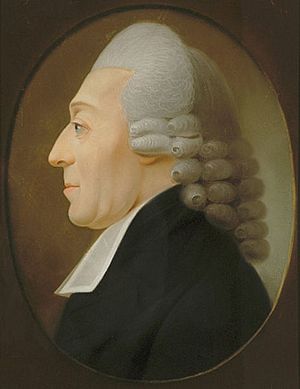Johann August Ephraim Goeze facts for kids
Quick facts for kids
Johann August Ephraim Goeze
|
|
|---|---|

Johann August Ephraim Goeze
|
|
| Born | 28 May 1731 Aschersleben, Principality of Halberstadt, Holy Roman Empire
|
| Died | 27 June 1793 (aged 62) |
| Nationality | German |
| Alma mater | University of Halle |
| Scientific career | |
| Fields | |
Johann August Ephraim Goeze (born May 28, 1731 – died June 27, 1793) was a German zoologist. He was born in Aschersleben, a town in what is now Germany. Goeze is famous for being the first person to describe tardigrades. These tiny creatures are also known as "water bears" because of how they look and move.
Contents
Who Was Johann Goeze?
Johann Goeze was born to Johann Heinrich and Catherine Margarete. He studied theology at the University of Halle. Theology is the study of religious beliefs. After his studies, he became a pastor, which is a type of religious leader.
His Life as a Pastor
In 1751, Goeze started his work as a pastor in Aschersleben. Later, he moved to Quedlinburg. In 1762, he became the pastor of St. Blasii in Quedlinburg. He continued his religious duties there. By 1787, he became the first deacon of the seminary in Quedlinburg. He passed away in Quedlinburg in 1793.
Discovering Tiny Creatures
Even though he was a pastor, Goeze had a great interest in science. He spent a lot of time studying small animals. He focused on invertebrates that live in water. These include creatures like insects and worms.
The First Look at Water Bears
In 1773, Goeze made a very important discovery. He was the first scientist to describe tardigrades. These amazing microscopic animals are incredibly tough. They can survive in extreme conditions. This is why they are often called "water bears" or "moss piglets." Goeze's work helped people learn about these unique creatures.
Studying Animal Parasites
Goeze also studied parasites. These are organisms that live on or inside another animal. In 1784, he noticed something interesting about tapeworms. He saw that the heads of tapeworms found in animal intestines looked similar to other tiny worm-like forms. This helped scientists understand more about how these parasites develop.
Legacy
Johann August Ephraim Goeze was an important figure in early zoology. His detailed observations helped expand our knowledge of the natural world. His discovery of tardigrades is still celebrated today. It shows his dedication to exploring the hidden life around us.
 | Bayard Rustin |
 | Jeannette Carter |
 | Jeremiah A. Brown |

